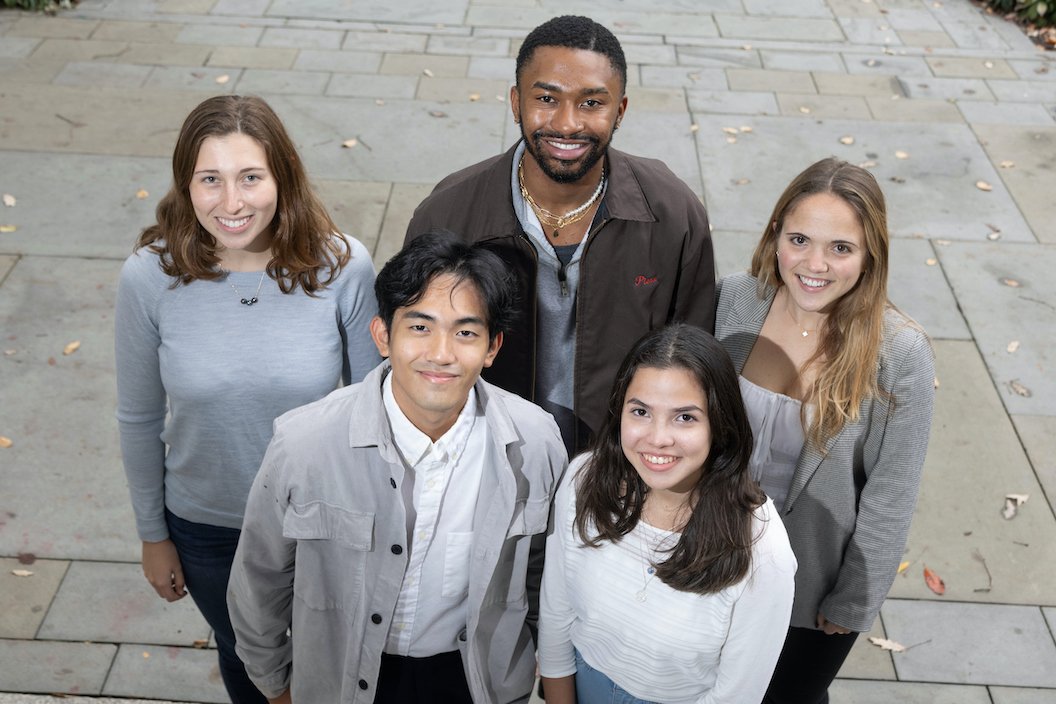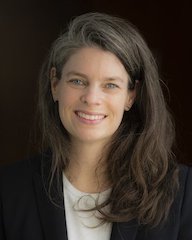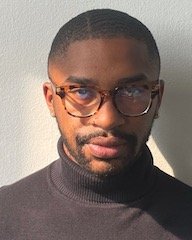Swarthmore Delegation Set for U.N. Climate Summit

The five-student delegation prepared throughout the fall semester by taking a course titled UNFCCC COP and the International Climate Regime.
During the first two weeks of November, more than 20,000 people will gather in Glasgow, Scotland, to discuss the climate crisis and the future of society as we know it. Heads of state, diplomats, academics, and business leaders from all over the world — including President Joe Biden and U.K. Prime Minister Boris Johnson — will be attending the United Nations Framework Convention on Climate Change (UNFCCC) 26th Conference of the Parties (COP26).
A delegation of eight students, faculty, and staff members from Swarthmore will also be in attendance at COP26. The College first received NGO-observer status in 2013 and has sent a delegation to each summit since. With the 2020 conference having been delayed due to the COVID-19 pandemic, this will be the first time that the COP will have met since December 2019. The student delegation has prepared throughout the fall semester by taking a course titled UNFCCC COP and the International Climate Regime, taught by Associate Professor of Political Science and Program Coordinator for Global Studies Ayse Kaya and Melissa Tier ’14, a Ph.D. candidate in environmental policy at the Princeton School of Public & International Affairs. The course, housed in the College’s Environmental Studies Program, is open to all students.
The delegation will be posting daily on this blog about their experiences, and students will be posting on the Instagram accounts @swatsustainability and @swarthmorecollege. The delegation will also be hosting two live, virtual events from COP26:
Thursday, Nov. 4: 12:30–2 p.m. - https://swarthmore.zoom.us/j/86225684632?pwd=MVpxV0lXVFhFdkwzTmtMbWxiV3FMdz09
Thursday, Nov. 11: 12:30–2 p.m. - https://swarthmore.zoom.us/j/86225684632?pwd=MVpxV0lXVFhFdkwzTmtMbWxiV3FMdz09
The UNFCCC is the U.N. entity tasked with coordinating the global response to climate change, with 197 member countries contributing to negotiations at the annual COP. In 2015, the COP ratified the Paris Agreement, where countries signed on to “nationally determined contributions,” or country-specific decarbonization plans, to mitigate climate change. The Paris Agreement aims to cut emissions to keep global warming below 2 degrees Celsius, specifically targeting 1.5 degrees of warming, which would mean that countries would need to drastically cut their emissions to net-zero in around 30 years.
This year, states will convene where they left off in 2019, and the COP26 negotiations may very well determine the future of the planet. The most recent Intergovernmental Panel on Climate Change report from 2021 gave a chilling account of the future ahead if not enough action is taken to reduce emissions globally. Every degree of warming will bring far worse consequences, including worsened droughts, accelerated sea-level rise, and an increase in the intensity of natural disasters. Though the future may look bleak, humans do have considerable agency in preventing some of these consequences of climate change.
Experts predict that based on current policies focused on mitigating carbon emissions, the world is on track to warm by 3 degrees Celsius, far over the Paris Agreement’s goal of 1.5 degrees Celsius. Without intervention in the next 10 years, scientists state that countries may not be able to hit the goal of 1.5 degrees Celsius of warming, which would have devastating impacts. Thus, COP26 seeks to strengthen the Paris Agreement to hit these essential targets.
The COP26 Presidency outlines four central goals of the conference:
- Secure global net-zero by mid-century and keep 1.5 degrees within reach.
- Adapt to protect communities and natural habitats.
- Mobilize finance.
- Work together to deliver.
Though these goals may look simple, they are ambitious on the international scale and will require many compromises and national sacrifices, especially by large emitters like the United States and China. With the Biden administration having rejoined the Paris Agreement (after the Trump administration previously withdrew), the United States will play a large role in this year’s negotiations. Though bills are still being debated domestically, Biden has stated that the United States will reduce its emissions 50–52% below 2005 levels in the next decade as its nationally determined contribution to the Paris Agreement. Ahead of COP26, several countries, like the United States, have updated their nationally determined contributions to reflect the urgency of the climate crisis. The Swarthmore delegation looks forward to being part of this pivotal event in climate history.
Perspectives
 Daniel Torres Balauro ’23
Daniel Torres Balauro ’23
Pago Pago, American Samoa
Environmental governance and policy major
Given that COP26 will be especially focused around the subject of loss and damage, I am most interested to learn about the institutional efforts to center frontline communities, especially Pacific nations, at the international stage. Over the last eight weeks, we’ve not only learned a lot about the limitations and flaws in existing frameworks within global environmental governance, but also the opportunities that non-state actors, namely civil-society activists, have in influencing these negotiations. Beyond meeting official delegates from other nations, I hope to make connections with activists in attendance to hear more about their work and how else we may be able to support their respective communities.
 Alicia Contrera ’22
Alicia Contrera ’22
J. Augusto Saldivar, Paraguay
Environmental studies and economics major
I am very excited for this opportunity to attend the most important annual event for climate change that, in many ways, defines our future.
As someone coming from a Latin American country, I am particularly interested in the role that Latin American countries will play in the negotiations at COP26 considering what is at stake for them as developing countries that are among the most vulnerable to climate change and in urgent need of adaptation plans and finance. More specifically, I am interested in looking at how the tensions between developed and developing countries play a role in the negotiations coming out of COP26. One of my personal goals is to make valuable connections to give continuity to the work at Glasgow after the conference. I am very excited to connect with youth activists and delegates from Latin America, as well as leaders from all over the world, to learn about their work and ways in which I can support them and get more involved.
 Clare Hyre
Clare Hyre
Sustainability Program Manager, Office of Sustainability
I am honored to represent Swarthmore College and the Office of Sustainability at the UNFCCC as a COP26 delegate and to experience climate negotiations in action firsthand. In addition to supporting students within the UNFCCC COP and the International Climate Regime class, I plan to learn about the national determined contributions that countries have announced to manage levels of carbon emissions and to understand in more detail global activities designed to support countries that are already experiencing loss and damage as a result of climate change. In partnership with the Environmental Studies Program, the Office of Sustainability will be providing a number of virtual engagement opportunities for the campus community, so please follow @swatsustainablity to learn more about these opportunities, or email sustainablity@swarthmore.edu.
 Kyra Hall ’22
Kyra Hall ’22
Princeton, N.J.
Environmental studies major and global studies and psychology minor
From the context of focusing my education at Swarthmore in climate change science, mitigation, and policy, I couldn’t be more excited by the idea of observing the ways in which carbon emissions-reduction targets are negotiated on the international stage. The negotiations are more important and timely than ever, keeping the urgency of the ratified goals of the Paris Agreement in mind. While at COP, I am ultimately interested in absorbing as much as possible from the scientists, researchers, and analysts that do the work behind the scenes to both generate the data and inform the decision-makers about the reality of our shared climate. While the negotiations will be on the main stage, I am also looking forward to exploring and connecting with the multitude of NGOs engaged in meaningful and progressive environmental work across the world who will be in attendance, hosting events, and sharing their work.
 Olivia Stoetzer ’23
Olivia Stoetzer ’23
Honolulu, Hawaii
Environmental studies and political science major
I am excited to experience climate governance on the global scale, especially as the climate community works to strengthen the Paris Agreement. I am interested in how the pandemic has impacted climate goals, and how the pandemic could be a means to build back through sustainable development. As countries work to agree on a market-based mechanism for mitigating carbon emissions, I am excited to witness these decisions and compare and contrast past policies. My goal of the conference is to learn as much as possible, specifically about carbon markets, the role of non-state actors, and sustainable development practices, while engaging with sustainability professionals from all over the world. I am so grateful and excited for the experience to attend COP26!
 Tyler White ’22
Tyler White ’22
Aboriginal homelands of the Clackamas, Cowlitz, Kathlamet, and Multnomah Tribes (colonial Portland, Ore.)
Honors major in environmental studies and minor in political science
I am immensely appreciative of this opportunity that the College and the Environmental Studies Program has prepared for me to attend the UNFCCC. I am focused on examining the status of Indigenous nations and their affiliated actors as they navigate the U.N.’s settler colonial and unjust frameworks for climate action. The activism of global frontline Indigenous communities against the sustained investment in fossil fuel extraction, and the embedded knowledge of reciprocating land management/relationship, is fueling me currently. I believe it is my individual role and responsibility to invoke the memorization of indigeneity across the physical and constructed landscapes of our campus. As such, my community project will utilize the principles of forensic architecture to compose new linguistic and cultural relationships mediated between Swarthmore occupants and the ancestral Lenni-Lenape land.


